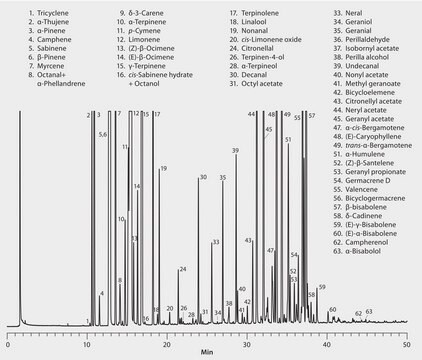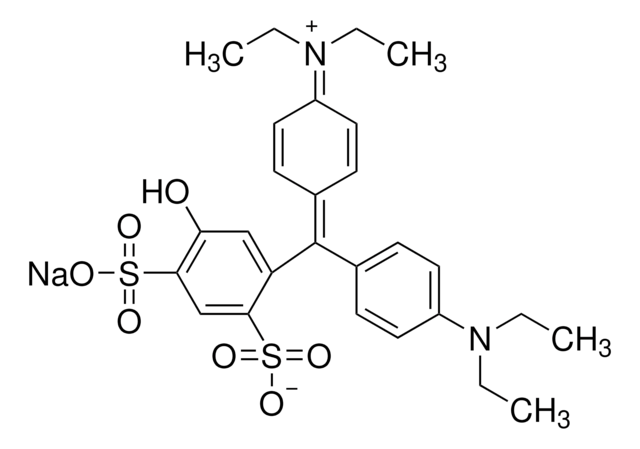Wszystkie zdjęcia(1)
Key Documents
24036
SPB®-5 Capillary GC Column
L × I.D. 60 m × 0.25 mm, df 0.25 μm
Zaloguj sięWyświetlanie cen organizacyjnych i kontraktowych
About This Item
Kod UNSPSC:
41115710
eCl@ss:
32119290
Polecane produkty
Materiały
fused silica
Poziom jakości
agency
meets requirements for USP G27 and G36
Parametry
-60-320 °C temperature (isothermal or programmed)
Wartość beta
250
df
0.25 μm
metody
gas chromatography (GC): suitable
dł. × śr. wewn.
60 m × 0.25 mm
grupa aktywna macierzy
Bonded; poly(5% diphenyl/95% dimethyl siloxane) phase
typ kolumny
capillary non-polar
Szukasz podobnych produktów? Odwiedź Przewodnik dotyczący porównywania produktów
Opis ogólny
Application: This non-polar general purpose column provides primarily a boiling point elution order with a slight increase in selectivity, especially for aromatic compounds.
USP Code: This column meets USP G27 and G36 requirements.
Phase:
USP Code: This column meets USP G27 and G36 requirements.
Phase:
- Bonded
- Poly(5% diphenyl/95% dimethyl siloxane)
- ≤0.32 mm I.D., <2 μm: -60 °C to 320 °C (isothermal or programmed)
- ≤0.32 mm I.D., ≥2 μm: -60 °C to 300 °C (isothermal or programmed)
- ≥0.53 mm I.D., <2 μm: -60 °C to 300 °C (isothermal) or 320 °C (programmed)
- ≥0.53 mm I.D., ≥2 μm: -60 °C to 260 °C (isothermal) or 280 °C (programmed)
Zastosowanie
SPB®-5 Capillary GC Column was used for speciation of the nitrogen compounds (quantitatively), which are polar and somewhat basic in nature, with chemiluminescence detection. It may also be used as stationary phase for determination of nivalenol and deoxynivalenol in cereals by electron-capture gas chromatography. Furthermore, it may also find application in being used as stationary phase in capillary column gas chromatography for determination of sterols.
Inne uwagi
We offer a variety of chromatography accessories including analytical syringes
Informacje prawne
SPB is a registered trademark of Merck KGaA, Darmstadt, Germany
This page may contain text that has been machine translated.
Wybierz jedną z najnowszych wersji:
Masz już ten produkt?
Dokumenty związane z niedawno zakupionymi produktami zostały zamieszczone w Bibliotece dokumentów.
Determination of nivalenol and deoxynivalenol in cereals by electron-capture gas chromatography.
Scott PM
Journal - Association of Official Analytical Chemists, 69 (5), 889-893 (1985)
O Suzuki et al.
Forensic science international, 46(3), 169-180 (1990-07-01)
Positive-ion electron impact (PIEI), positive-ion chemical ionization (PICI) and negative-ion chemical ionization (NICI) mass spectra of 9 carbamate pesticides are presented. In the PIEI mode, the spectra showed small molecular peaks, intense or base peaks due to M - CH3NHCO
Luisito Cercaci et al.
Journal of chromatography. A, 985(1-2), 211-220 (2003-02-13)
The sterol composition of extra virgin olive oil is very characteristic and, thus, has become a helpful tool to detect adulterations with other vegetable oils. Special attention has been addressed to the separate determination of the free and esterified sterol
J M Jurado et al.
Talanta, 106, 14-19 (2013-04-20)
4-Methylsterols and 4,4-dimethylsterols of 47 samples of subcutaneous fat from Iberian pigs reared on two different fattening systems, "Extensive" and "Intensive", have been analyzed by GC-MS and GC-FID. The lipids were extracted by melting the subcutaneous fat in a microwave
Development of a passive sampler to measure personal exposure to gaseous PAHs in community settings.
Zhihua Fan et al.
Environmental science & technology, 40(19), 6051-6057 (2006-10-21)
A sensitive, simple, and cost-effective passive sampling methodology was developed to quantify personal exposure to gaseous polycyclic aromatic hydrocarbons (PAHs). A Fan-Lioy passive PAH sampler (FL-PPS) is constructed from 320 sections of 1-cm long SPB-5 GC columns (0.75-mm i.d. and
Nasz zespół naukowców ma doświadczenie we wszystkich obszarach badań, w tym w naukach przyrodniczych, materiałoznawstwie, syntezie chemicznej, chromatografii, analityce i wielu innych dziedzinach.
Skontaktuj się z zespołem ds. pomocy technicznej





